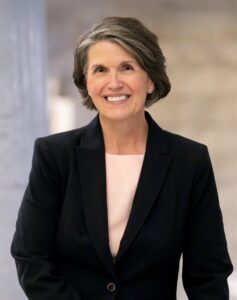Who is a member?
Our members are the local governments of Massachusetts and their elected and appointed leadership.

Tami Pyfer
Tami Pyfer has experienced the challenges and rewards of public service at many levels — from PTA president to Utah state education board member, and from city councillor to gubernatorial advisor, with steps in between.
Now a nonprofit leader and USA Today’s 2025 Woman of the Year for the state of Utah, Pyfer will share her insights as the keynote speaker at the Women Elected Municipal Officials Leadership Luncheon during the MMA’s Connect 351 conference on Jan. 23 in Boston.
Pyfer is the chief external affairs officer for UNITE and the co-creator of the nonprofit’s Dignity Index, a tool that measures political speech along an eight-point continuum from contempt to dignity. While public officials and citizens alike express dismay over incivility in politics and social media, Pyfer offers a hopeful message for pushing back against the “outrage industrial complex” and restoring more dignity and grace to our interactions.
“We can do better in our families. We can do better in our communities,” Pyfer said in a February 2024 interview with the Associated Press. “We can solve problems together in politics.”
Pyfer’s path from politician to dignity champion started at the local level. In addition to involvement in local schools, she served for eight years as a city councillor in Logan, Utah, followed by four years on the Utah State Board of Education. She taught at Utah State University’s special education teacher preparation program and served as education policy advisor to former Utah Gov. Gary Herbert for seven years before joining UNITE in 2020. She also sang with the Tabernacle Choir at Temple Square for seven years, and later served as the choir’s director of external relations.
In a 2023 Politico profile, Pyfer said that one of her proudest moments came as a city councillor, where she worked on a team that created a new ambulance system and brought emergency services closer to residents in more rural areas. She told Politico that she got a call five years later from a colleague whose infant grandchild had experienced a medical emergency.
“He said, ‘I wanted you to know that we saved my grandbaby’s life,’” she told Politico. “It’s not often that you get to feel like your voice and your advocacy can impact the community in that way.”
In more recent years, politics began to wear on Pyfer, a married mother of five who heads a family with diverse political beliefs. When she worked in the governor’s office, people’s comments vilifying people on the left or right invariably insulted some part of her family. The public fights around education and pandemic-era hostilities over public policy led to her to resign from state government in the fall of 2020, according to the Politico article.
“People stopped blaming COVID,” she told Politico, “and started blaming each other.”
Pyfer now collaborates with UNITE founder Timothy Shriver — Connect 351’s Friday keynote on Jan. 23 — and Tom Rosshirt. Together, they have been working to bridge divisions in the country through the Dignity Index, a tool intended to help people reflect on their speech and how they talk about people with different views.
“Everything else aside, every one of us is a human being, and therefore we deserve to be treated with dignity, with this basic level of human dignity,” she said in a March episode of the “Brave Nation with Leigh Sloan” podcast. “And that word has resonated with people. People seem to be able to understand that innately.”
In 2024, Pyfer was named a fellow by the Emerson Collective, an organization founded by entrepreneur Laurene Powell Jobs to support philanthropic work and investments.
On the “Brave Nation” podcast, Pyfer said her fellowship project involved applying the Dignity Index to women in politics, as a way to support and strengthen their participation in leadership and elected roles. She said she met with elected women officials all over Utah, including mayors, city councillors and school board members, to hear their concerns, and to explain the possibilities of the Dignity Index.
She said women are particularly turned off by the toxic nature of politics.
“A lot of people will tell me, a lot of women will say, ‘Yeah, I couldn’t do that,” she said. “‘I know we need more women in politics, but it’s so awful. I can’t do that.’ And I say, ‘Actually you can.’”